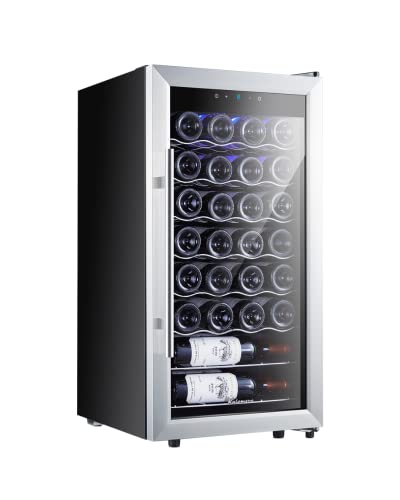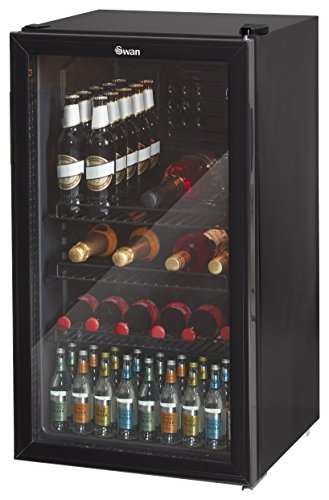This Is A Beer And Wine Refrigerator Success Story You'll Never Be Abl…
페이지 정보

본문
 Choosing a Beverage and Wine Refrigerator
Choosing a Beverage and Wine RefrigeratorWhen you're hosting guests, or sipping a glass of wine during an evening meal, this dual-zone fridge is the perfect solution to keep and chill both wine and beers. It can be freestanding or built-in, and comes with a seamless seamless door that is able to fit into any space.
While vibration is generally safe however, it can cause disturbance to the sediment of a bottle and cause complex chemical reactions that aren't evident. This can reduce the flavor and reduce esters over time.
Humidity Control
Humidity refers to the amount of water vapor in the air, and it changes throughout the day based on a variety of factors. Temperature, precipitation and wind can all have an enormous impact on the humidity levels. It is important to maintain the humidity level at a certain level for a variety of reasons. Humidity affects the weather patterns as well as indoor air quality and wine storage. The delicate wine's composition contains many aromatic compounds that are sensitive to changes in humidity. The wine refrigerator mini's flavor can be affected by high humidity. It can alter the balance of these aromatic compounds. A wine refrigerator can help maintain the right level of humidity to preserve the wine's flavor.
A wine refrigerator can help prevent cork deterioration and ensure that the seal is secure. Corks can dry out if the humidity is too low. This allows oxygen to enter the bottle, which accelerates the process of aging. A wine refrigerator can be used to maintain an amount of humidity that is between 55% and 65 percent.
Wine coolers are also a great way to store wine and beer. A wine cellar is primarily designed for long-term storage. A lot of these units are equipped with a separate space for beer bottles, meaning you can keep your favourite lagers and craft beers in the same place as your favorite wines. These units are designed to regulate temperature and humidity in order to prevent condensation, which can cause damage to labels and packaging.
The majority of models have an hygrometer that allows you to check the humidity level in your wine cooler and adjust it accordingly. You can also use a humidifier to boost the humidity in your wine fridge.
If you decide to utilize a dehumidifier make sure it is set up in a separate room from the wine fridge. This will ensure that the dehumidifier does not absorb any of the wines or beers you're storing in your fridge. If you plan to store your wine for a prolonged period of time, controlling the humidity is crucial. In a short amount of time, you might not notice any changes in your wine, but over months or years, a lack of humidity can dramatically alter the taste of your preferred wines.
Vibration Absorption
Vibrations in the wine refrigerator wine rack may alter the natural aging process of wines that are stored there. Even small vibrations can trigger disturbance in the sediment inside the bottle, which triggers intricate chemical reactions that reduce esters and dull the wine's flavor with time. All La Sommeliere units have a vibration absorption system that minimizes the sound and tremors and allows your wine to age in peace and efficiently.
Apart from the fact that wine coolers generally emit less sound than normal refrigerators, they're susceptible to noise problems due to the system of fans and refrigerant circuits that are found in the majority of units. For this reason, it is important to follow all clearance guidelines when installing your wine cooler and place it in a quiet spot far from any other sources of disturbance.
It is also recommended to clean your wine cooler on a regular basis using a nonabrasive cleaning product and let it "air out" for several minutes prior to filling it up with bottles. This will lessen the amount of dust or dirt that may build up in the air vents.
If you notice that your wine fridge is making loud noises it could be caused by a malfunctioning compressor or electric fan. The compressor is typically situated behind the wine fridge and if it is not properly positioned or is struck by something behind it, it could shake itself free from its rubber mounts which will cause loud humming noises.
The compressor wine cooler functions as a normal refrigerator, electronically compressing air molecules that lowers their temperature, and then blowing them throughout the interior of the refrigerator. This type of cooling is significantly more energy efficient than other cooling methods such as evaporator or frost-free refrigerators. Compressor wine coolers are noisy and require regular maintenance. Many consumers opt for thermoelectric wine chillers that do not require a compressor.
Temperature Control
Like wine, beer also has its own temperature requirements to help it maintain optimal flavor. This makes it essential to select a beverage and wine fridge with temperature controls that can be adjusted so you can store your beverages at the ideal serving and storage temperatures for each type. There are dual-zone models that provide separate temperature zones for wine bottles and separate temperature zones for other beverages, such as beer.
Generally speaking, most beer styles prefer to be served colder than wine. However, the optimal serving temperature for a given style is determined by its nature and the method of making it. Wheat beers and pilsners ought to be served between 40 and 50 degrees Fahrenheit. IPAs, barleywines and stronger ales should be served at 50 to 55 degrees Fahrenheit. If you let a beer warm too long it will begin to develop an unpleasant "skunky" smell that will ruin the drinking experience.
You'll want a wine refrigerator that can provide the right temperature range to your favorite reds and whites. Some wine refrigerators have humidity control features to help keep the wine from oxidation and to keep the corks in good shape. Some wine fridge freestanding refrigerators contain a special UV-blocking glass that helps stop sunlight from damaging the wine Chiller and aging it prematurely.
The temperature control system in a refrigerator can be powered either by compressor or thermoelectric cooling. Compressor units use vapor compressors to reduce temperatures in the wine refrigerator, while thermoelectric models use electronic convection fans to circulate cool air around the refrigerator. For the best results, most refrigerators incorporate these technologies.
If you're planning to purchase an appliance for wine or beverages that utilizes compressor technology, you should look for one that has vibration-absorbing shockpads. The vibrations triggered by compressor-based processes can disrupt the maturation process of wine and speed up the process of oxidation.
Although you can purchase a fridge that's designed specifically for wine, you might find it more cost-effective to shop for a standard refrigerator, or even a standard refrigerator with a large interior with movable shelves and ample storage on the doors. You can alter the space to accommodate a variety of bottles and cans, such as wine, beer and other beverages.
Storage Options
Consider a cooler for your drinks If you are a host at parties. These refrigerators can store bottles and cans of wine and beer along with other ice cold beverages like soda and water. These fridges are available in both built-in and freestanding models. Built-in models can be incorporated into cabinets or under counters in kitchens that have small space.
Refrigerators of both types come in different sizes and styles which makes them suitable for homes with a variety of. Choose models with shelves that slide out to let you easily access your favorite brews and vinos. Some refrigerators come with soft LED lighting to showcase your collection with soft, gentle light. Some even offer a humidity control option. This can help to stop the growth of frost on your wine and beer bottles, ensuring that you can enjoy your favorites without worrying about a buildup of frost.
A refrigerator with two zones can accommodate your favorite wines at their optimal serving temperatures. You can also store craft beers in separate zones since it's at similar temperatures to the wine bottle. A dual zone beer and wine refrigerator can also accommodate larger bottles of spirits or beer than a standard fridge.
The proper storage conditions can increase the life of your beer and wine, so be sure you keep them in a well-ventilated area that provides adequate light protection. Keep the refrigerator free of odors and dust that could affect the taste of your beverages.
If you're planning to store a huge collection of wines and want to preserve their quality, consider the cellar refrigerator. This kind of refrigerator is designed for long-term storage and operates at a slightly warmer temperature than a inexpensive wine fridge refrigerator, allowing your bottles to develop their best flavor. A cellar refrigerator also has humidifiers that keep the proper humidity level. This ensures that the cork stays humid and inert. It also stops external air and food items that are in your refrigerator from entering your bottle and deteriorating it over time.

- 이전글The 9 Things Your Parents Teach You About Replacement Smart Car Key 24.12.29
- 다음글Guide To Robotic Cleaner And Mop: The Intermediate Guide In Robotic Cleaner And Mop 24.12.29
댓글목록
등록된 댓글이 없습니다.


